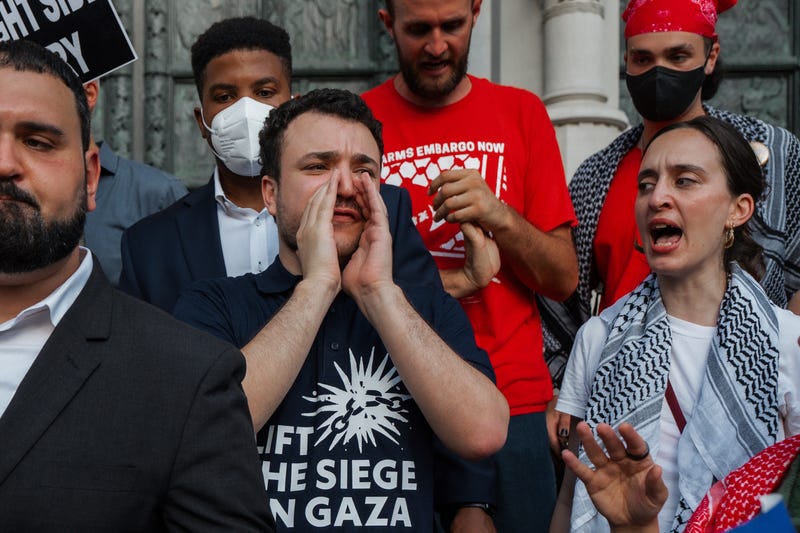
BOSTON (AP) — The Trump administration violated the Constitution when it targeted non-U.S. citizens for deportation solely for supporting Palestinians and criticizing Israel, a federal judged said Tuesday in a scathing ruling directly and sharply criticizing President Donald Trump and his policies as serious threats to free speech.
U.S. District Judge William Young in Boston agreed with several university associations that the policy they described as ideological deportation violates the First Amendment as well as the Administrative Procedure Act, a law governing how federal agencies develop and issue regulations. Young also found the policy was “arbitrary or capricious because it reverses prior policy without reasoned explanation.”
“This case -– perhaps the most important ever to fall within the jurisdiction of this district court –- squarely presents the issue whether non-citizens lawfully present here in United States actually have the same free speech rights as the rest of us. The Court answers this Constitutional question unequivocally ‘yes, they do,’” Young, a nominee of Republican President Ronald Reagan, wrote.
Tricia McLaughlin, assistant secretary of the Department of Homeland Security, released a statement that didn't directly address the ruling but said Young was “smearing and demonizing federal law enforcement.”
“Our ICE law enforcement should be thanked for risking their lives every day to arrest murderers, pedophiles, rapists, gang members, and terrorists instead of vilified by sanctuary politicians,” she said. "It’s disheartening that even after the terrorist attack and recent arrests of rioters with guns outside of ICE facilities, this judge decides to stoke the embers of hatred.”
Plaintiffs in the case welcomed the ruling.
“The Trump administration’s attempt to deport students for their political views is an assault on the Constitution and a betrayal of American values," said Todd Wolfson, president of the American Association of University Professors union. “This trial exposed their true aim: to intimidate and silence anyone who dares oppose them. If we fail to fight back, Trump’s thought police won’t stop at pro-Palestinian voices—they will come for anyone who speaks out.”
The ruling came after a trial during which lawyers for the associations presented witnesses who testified that the Trump administration had launched a coordinated effort to target students and scholars who had criticized Israel or showed sympathy for Palestinians.
“Not since the McCarthy era have immigrants been the target of such intense repression for lawful political speech,” Ramya Krishnan, senior staff attorney at the Knight First Amendment Institute, told the court. “The policy creates a cloud of fear over university communities, and it is at war with the First Amendment.”
Young will hold a separate hearing on the relief requested by the plaintiffs, which is likely to be a request that the Trump administration stop engaging in ideological deportations.
Lawyers for the Trump administration put up witnesses who testified there was no ideological deportation policy as the plaintiffs contended.
“There is no policy to revoke visas on the basis of protected speech,” Victoria Santora told the court. “The evidence presented at this trial will show that plaintiffs are challenging nothing more than government enforcement of immigration laws.”
John Armstrong, the senior bureau official in the Bureau of Consular Affairs, testified that visa revocations were based on longstanding immigration law. Armstrong acknowledged he played a role in the visa revocation of several high-profile activists, including Rumeysa Ozturk and Mahmoud Khalil, and was shown memos endorsing their removal.
Armstrong also insisted that visa revocations were not based on protected speech and rejected accusations that there was a policy of targeting someone for their ideology.
One witness testified that the campaign targeted more than 5,000 pro-Palestinian protesters. Out of the 5,000 names reviewed, investigators wrote reports on about 200 who had potentially violated U.S. law, Peter Hatch of ICE’s Homeland Security Investigations Unit testified. Until this year, Hatch said, he could not recall a student protester being referred for a visa revocation.
Among the report subjects was Palestinian activist and Columbia University graduate Khalil, who was released last month after 104 days in federal immigration detention. Khalil has become a symbol of Trump’s clampdown on the protests.
Another was the Tufts University student Ozturk, who was released in May from six weeks in detention after being arrested on a suburban Boston street. She said she was illegally detained following an op-ed she co-wrote last year criticizing her school’s response to the war in Gaza.
Young accused Homeland Security Secretary Kristi Noem, Secretary of State Marco Rubio and their agents of misusing their powers to target noncitizens who were pro-Palestinian in order to silence them and, in doing so, “intentionally denying such individuals (including the plaintiffs here) the freedom of speech that is their right.”
“Moreover, the effect of these targeted deportation proceedings continues unconstitutionally to chill freedom of speech to this day,” he added.
Young also criticized Trump in his 161-page ruling, suggesting he supported the policy, even though he may not have authorized its operation. “The facts prove that the President himself approves truly scandalous and unconstitutional suppression of free speech” on the part of two of his senior Cabinet secretaries, he wrote.
He also used his ruling to draw attention to what he sees as Trump’s broader effort to stifle dissent and attack anyone whom he disagrees while at the same time urging Americans to stand up to these threats. Referencing Reagan speaking about the fragility of freedom when he was the governor of California, Young said he believes that Trump appreciates and understands those words but fears "he has drawn from it a darker, more cynical message.”
“I fear President Trump believes the American people are so divided that today they will not stand up, fight for, and defend our most precious constitutional values so long as they are lulled into thinking their own personal interests are not affected,” he wrote.